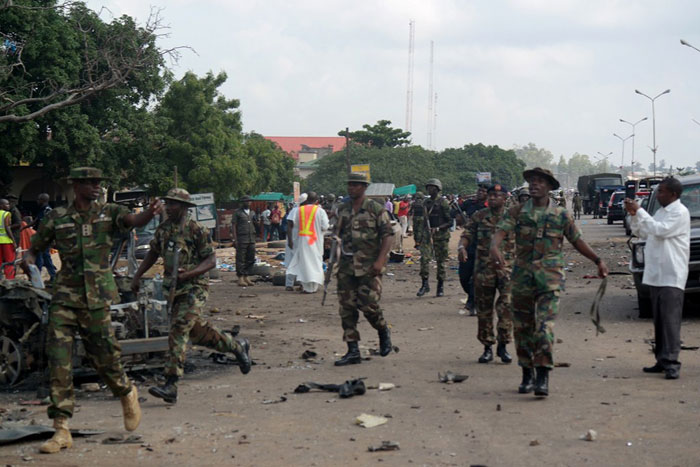Military officers walk at a scene where a bomb exploded in Kaduna, north of Nigeria, on Wednesday.
Reuters/Kaduna, Nigeria
At least 82 people were killed on Wednesday in two bombings in the northern Nigerian city of Kaduna targeting opposition leader and former president Muhammadu Buhari at a busy market and a moderate Muslim cleric about to lead a crowd in prayer.
The attacks bore the hallmarks of Islamist group Boko Haram but may also have been linked to politics ahead of 2015's elections.
The deadlier blast targeted Buhari's convoy at the crowded Kawo market, his son said on the scene. A Red Cross official said at least 50 people were killed there.
Buhari was the main opposition party contender against President Goodluck Jonathan in the 2011 election and remains a key figure in the opposition alliance. He was riding in an armour-plated sports utility vehicle and was not wounded.
A crowd gathered at the scene of the incident, until the military dispersed them by firing shots in the air. Smoke rose from another vehicle destroyed in the blast.
Earlier, a suicide bomber targeting a moderate cleric killed at least 32 of his congregation on a busy commercial road.
Thousands were gathered for prayers with Sheikh Dahiru Bauchi in Murtala Muhammed square, and when his convoy pulled up, the bomber lunged at him before being stopped by his private security, witnesses and police said.
"The attack was targeted at the sheikh. No arrest has been made yet," said police commissioner Shehu Umar.
The bomber did not injure Bauchi, several witnesses said. Mustafa Sani, a volunteer for Bauchi's mosque evacuating bodies, said there were 32 confirmed dead so far.
The military used pick-up trucks to cordon off the area. Sirens wailed as fire engines raced to the scene.
An angry crowd started throwing stones at police, who responded with teargas. Some followers had come from Senegal, Chad and Niger to see the popular sheikh.
There was no immediate claim of responsibility for either blast, but Islamist militant group Boko Haram has been staging attacks, especially with explosives, outside its northeastern heartlands for the past three months.

